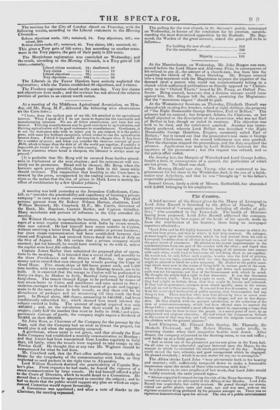A meeting was held yesterday at the Jerusalem Coffeehouse, Corn-
bill, to " consider the practicability and expediency of forming a private company" to carry on a steam communication with India. The chief persons present were Sir Robert Wilmot Horton, chairman, Lord William Bentinck, Mr. Crawford, M. P., Mr. Curtis, Governor of the Bank, Mr. Bagshaw, Captain Barber, and Captain Grindley. Many merchants and persons of influence in the City attended the meeting.
Sir Wilmot Horton, in opening the business, dwelt upon the advan- tages of a more regular communication with India by steam-vessels, than now existed. He had himself been seven months in Ceylon, without receiving a letter from England, on public or private business; but since steam-communication had been established between that island and England, he had received letters dated the 31st of July on the 81st of August. He felt certain that a private company would succeed ; but for himself, he would have nothing to do with it, unless the capital were bond fide subscribed.
Captain James Barber then submitted the proposed plan of opera- tions to the meeting. It is intended that a vessel shall sail monthly to the three Presidencies and the Straits of Batavia ; the passage. money not to exceed that now charged by vessels passing the Cape of Good Hope. Five steam-ships of 600 horse power each, and 1,500 tons burden, with two smaller vessels for the Bombay branch, are to be built. It is expected that the voyage to Ceylon will be performed in thirty-six days, to Madras in forty, Bombay forty-two, and Calcutta forty-three. The transit through Egypt to be performed by means of iron steam-boats to Cairo, and omnibuses and vans across to Suez ; skeleton.carriages to he used for the land transit of goods and luggage, made to fit the same places in both vessels, so that there will be no disturbance of packages and no uncovering till they reach the final port. In Bengal alone, 800 shares, amounting to 140,0001., had been conditionally subscribed for; which showed how much interest the subject excited in India. The amount of capital required wis only 400,0001.; and, on the calculation that there would be 2,300 pas- sengers, (only half the number that went to India in 1836,) and a pro- portionate carriage of goods, the company might expect a dividend of 70,0001. on their 400,0001.
Sir John Ross, as Chairman of the Company for the passage by the Cape, said that the Company had no wish to thwart the project, but would give it aid when the opportunity occurred.
A gentleman, whose name is not given, said that already the East India Company had established a monthly communication to Bombay ; and that letters had been transmitted from London regularly in forty days, till lately; when the vessels were required to take troops to the Persian Gulf. He thought that at any rate Mr. Waghorn should be compensated for what he had done.
Mr. Crawford said, that the Post-office authorities were chiefly to blame for the irregularity of the communication with India, as they neglected to send packets in the right time to Alexandria.
Lord William Bentirick doubted the practicability of Captain Bar- ber's plan. From inquiries he had made, he feared the expense of a steam communication by large vessels. He had himself offered a plan to the Court of Directors, which he would detail to a Committee. He moved that a Committee be appointed to consider the subject ; and he bad no doubt that the public would support any plan on which an expe- rieneed Commitee would report favourably. A Committee was appointed ; and after a rote Of thanks to the Chairman, the meeting separated. The polling for the new church, in St. Saviour's parish, terminated on Wednesday, in favour of the resolution for its erection, notwith- standing the most determined opposition by the Radicals. Mr. Ray- mond, the Warden of the great account, stated the gross poll to be as follows—
For building the new church 169 For the amendment 256 Majority 113


























 Previous page
Previous page